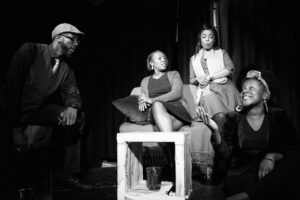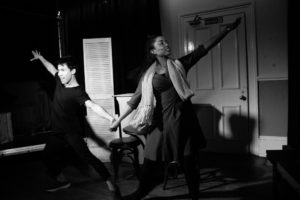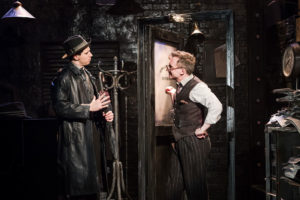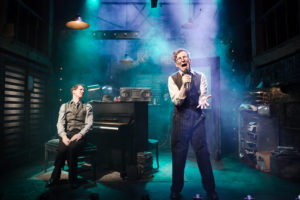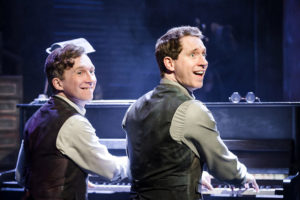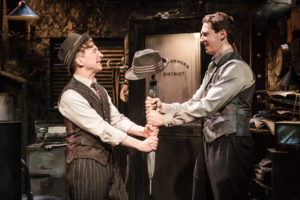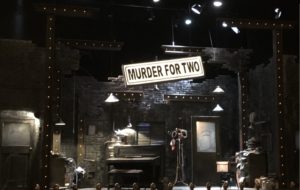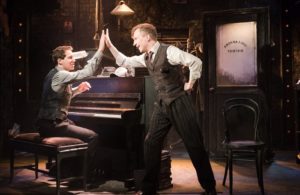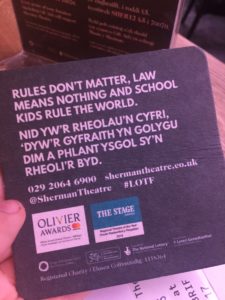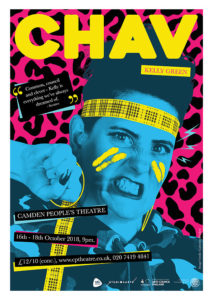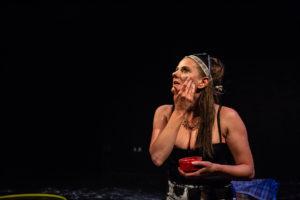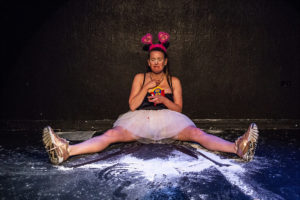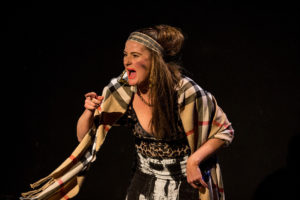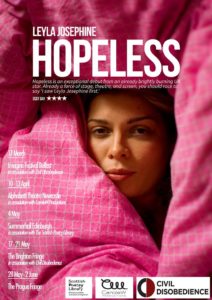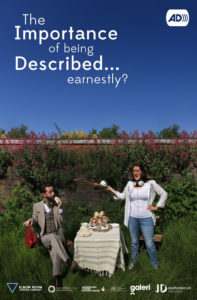Spilt Milk’s double bill of Street by Susan Monkton and Izzy’s Manifestos by Kevin Jones (23/10 – 26/10 2018) is their second production of the year, having staged the impressive Five Green Bottles by Joe Wiltshire-Smith at the Cardiff Fringe in May. Along with various scratch nights, the company are a busy one, offering various opportunities for Cardiff’s creative scene.
And this double bill showcases exactly that. A work-in-progress piece from emerging writer and actor Susan Monkton, as well as a more polished piece from Kevin Jones.
The evening starts as any Spilt Milk night would, with a warm welcome at the door and an invitation to the bar, where lovely Kate and Leo from AJ’s Coffee House will serve you. The setting of AJ’s is intimate, cosy and always makes for a nice evening of theatre, this being no different.
Street by Susan Monkton  (3 / 5)
(3 / 5)
Street is only Susan Monkton’s second piece of writing that she has shared with the public, and with it being a work-in-progress, that has been taken into account for the review.
The play follows a young woman, Laura (portrayed by Ella Maxwell), as she walks home from a one night stand, only to be met with a bomb explosion on City Road in Cardiff. She tends to the wounds of Sammy, a young boy, before fleeing the scene. This causes guilt in her mind to circle, until a knock at the door from a police officer assures her that the boy is okay, and that she’s done nothing wrong. The opposite in fact, she is “my hero” in Sammy’s words.
Overall, it feels as though the writer has found a topic, but not really explored in depth the character or the situation. The point of the play, why the story needed to be told by this character and the writer’s aims aren’t really clear.
The police officer scene is fairly awkward, in part because the officer speaks over the sound system as a voice-over. But it also feels unrealistic for the officer to show up, bring her pair of shoes and comfort her.
Aspects like Sammy being revealed as a refugee is a detail that feels thrown in, unnecessary and really takes characterisation away from him. Almost to ramp up the tragedy, but ends up falling into the trope of white heroinism.
The setting of City Road is a multicultural area of Cardiff and in the national discussion of refugees and terrorism, it is impossible to get away from the topic of Islam. The connotations of these aspects of the play really need looking into as combined with the white heroism, it creates a potentially problematic play.
A play that focuses on the victims and tragedy of the situation could have more responsibility in considering the connotations of the setting, characterisation and main themes.
The opening monologue about Laura’s night out is a bit odd in contrast to the rest of the piece. However, it does portray Laura as someone ultimately not ready to be a hero. That continues to be a big theme throughout the play, but a theme that makes the protagonist fairly passive. Things happen to her rather than because of her actions.
There are some really strong moments of humour early in the play, which is definitely a strong area of Monkton’s writing having seen her previous work. There is also strong characterisation for Laura and some really emotional writing. The script shows real promise but it requires work and needs to be more careful in certain areas.
Ella Maxwell does an excellent job in portraying Laura, really throwing herself into the script, bringing out the humour when appropriate, but also handling the more emotional parts of the play really well also.
Street is directed with real care from Becca Lidstone with close attention to detail. Paced well with key points in the script really standing out. No doubt that some of Maxwell’s excellent work is down to this direction, not to take any credit away.
There were moments where sound effects used felt awkward which Lidstone and sound designer Nick Laws could work on. They seemed to be chucked in and rather than adding to the scene, distracted somewhat.
Overall it is worth going to see to give feedback on the script and for Ella Maxwell’s great performance. But certainly a play that needs work.
Street by Susan Monkton
Cast: Ella Maxwell as Laura
Directed by: Becca Lidstone
Produced by: Tobias Weatherburn
Sound Design and Stage Manager: Nick Laws
Venue: AJ’s Coffee House
From Spilt Milk Theatre
Izzy’s Manifestos by Kevin Jones  (4 / 5)
(4 / 5)
Izzy’s Manifestos by Kevin Jones was initially performed at the Edinburgh Fringe Festival in 2017. However, has been developed and brought back as a brand-new production by Spilt Milk.
The play follows a young girl called Izzy, who, after her father’s death when she is fourteen, creates manifestos by which she lives her life. It is an unpredictable, hilarious, yet potentially heart-breaking piece of theatre.
I say potentially, as the script certainly doesn’t live up to it’s high potential. That’s not to say it’s not of a high quality. It is really funny and a strong piece of theatre. However, it ends abruptly and leaves you wanting more.
Before the play starts, Angharad Berrow goes around the room, in character, telling people that the play was about to start. This along with Berrow’s energy sets the tone for the play which moves very quickly, jumping from stage to stage of Izzy’s life.
Izzy is witty, excited, evil and brilliantly portrayed by Angharad Berrow. Not afraid to break the fourth wall, which works well as there are planned and unplanned examples of this, all of which Berrow handles very well.
The piece is well directed by Luke Hereford and despite lack of emotion in the character, Hereford finds other ways of displaying what is under the surface of the character. In particular, manipulating tone and pace to good effect. This really shows what a promising director he really is.
The main issue here comes in that there seems something missing at the end. Some emotion. Izzy spends the whole play (and previous years of her life) ignoring her father’s death and not grieving. When she finally lets herself think of her father, which she admits to the audience, there doesn’t seem to be a consequence of this. The story seems focused on Izzy reaching that point – but not on what that might mean for her moving forward. The ending is generally rushed and seems unfinished.
It’s hard to say exactly what it needs, but it needs some more care and to show more emotion in the conclusion. Just as the play feels like it’s getting somewhere, it finishes.
It was the only major issue with the play, but it was the difference between four and five stars. Other than that, it is a really enjoyable piece of theatre on all fronts and definitely worth seeing.
Izzy’s Manifestos by Kevin Jones
Cast: Angharad Berrow as Izzy
Directed by Luke Hereford
Produced by: Tobias Weatherburn
Sound Design and Stage Manager: Nick Laws
Venue: AJ’s Coffee House
From Spilt Milk Theatre
Review by Gareth Ford-Elliott
 (5 / 5)
(5 / 5)

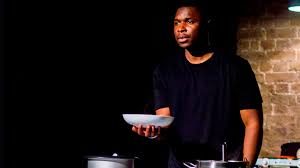
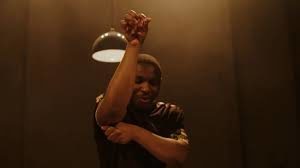

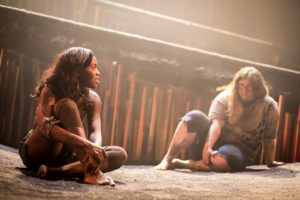
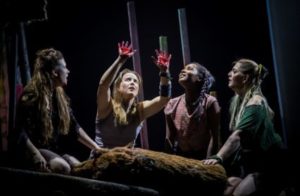

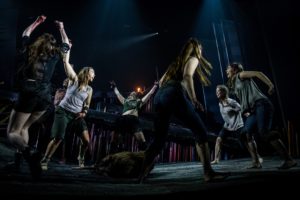
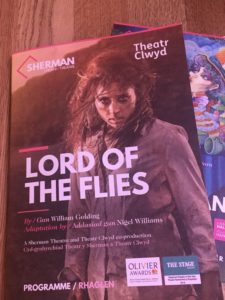
 (3.5 / 5)
(3.5 / 5)
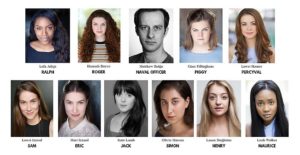
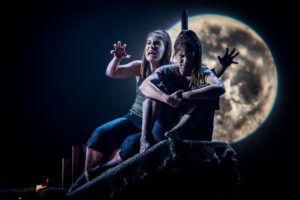
 (3 / 5)
(3 / 5) (4 / 5)
(4 / 5)

